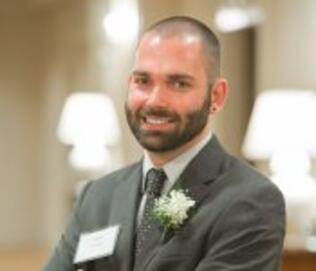
Creative Writing Award Winner - 2015
Class of 2015
About David Collett
David Collett holds a bachelor’s degree in ministry and English, and graduate degrees in both English and teaching. He will graduate from YSN in May 2017, specializing in adult/gerontological acute care. Prior to YSN, he worked as a middle school teacher in New York.
Number 50 To A.H. in Room 20 – Goodbye, and Thank You
Patient details have been modified to maintain privacy.
“We had a Brady this morning. Room 20.” The charge nurse’s serious tone interrupted our clinical group’s typical pre-conference banter.
“Brady. Bradycardia. Slow heart rate. Typically should be above sixty beats per minute,” I think, repeating back the normal vitals all new nursing students were required to memorize. “But why did she say ‘Brady’ in that tone?”
My preceptor interrupts firmly and intently, “We’ll do the Brady care.” “Brady care? What?” She explains the morgue at the hospital was named for a Brady, and the staff members on the unit refer to patients who die as “Bradys.” “So nothing to do with the slow heart rate,” I think. She instructs us to check vitals for other patients, and then to gather outside Room 20 – your room.
Room 20 is labeled with a simple, handwritten note: “Do Not Disturb.” I take a deep breath as I walk through the door, and gather around your bed. You are naked, slightly bloated, mouth and eyes agape, and I look at your still-fresh surgical wounds. I’m uncomfortable with how vulnerable you are – or maybe how vulnerable I feel. My preceptor introduces herself the way she does to all patients. “Good morning, Albert. I’m your nurse, and I’ve got some of my students with me today,” she says as she grasps your hand, showing us it is okay to touch you. Initially, this introduction strikes me as odd – but I quickly realize it would feel wrong to not introduce us.
There’s classical music playing in the background. She walks to the end of the room and opens the window – something I learn is tradition for nurses performing this care. She comes back to you, and says, “It’s okay for you to go now, Albert.” I glance up at the open window, and sense that you don’t leave quite yet, staying to help us with an important part of our nursing education.
Our preceptor, usually feisty, talks in a gentler tone about the processes your body is undergoing, and teaches us how to take care of you. She shows us how to use the post-mortem care kit. I’m surprised by how flat the package is that contains the pads, tags, and bags – it seems small for a purpose this somber and serious. As she touches you and talks to you, she describes some of your medical history and gives us insights into your life. We take out your catheter, remove your bandages and dressings, and begin to clean you. I’m handed a toe tag, and asked to place it on you. I take the tag – a small, sobering symbol – and pull the string around your left toe. I pause, and wonder what type of knot I am supposed to use. I settle on a small bow, which, somehow, feels appropriate.
The other students gingerly move you as they finish cleaning you. “His back is still warm,” someone comments. We’re surrounded by the sterile walls of the trauma unit, adorned only by sanitizer dispensers and patient educational materials, a place where order, procedures, and data rule – and your back is still warm.
It reminds me that you were just with us. For the seventy-eight years prior to 7:02 am this Wednesday in September, your heart beat. You grew, ate, slept, laughed, jumped, ran, excreted, saw, heard, married, loved, cried, learned and lived. I look at your hands and think of the grandchildren you held, the dishes you prepared, and the lovers you embraced. You, Albert – you were just with us. And somehow, in a way I can’t understand – I’m aware you are with us. We’re facing the loss of life, but at the same time, experiencing its completeness. I want to grapple with it, but I accept the moment and try to just be present with you, our patient.
Albert, there are times in life when we feel the fullness of reality – we feel the vigor and zest of being wondrously alive. There are other times where we are innately aware of the ambiguous, spiritual aspects of ourselves. The completeness of life is found in the rare moments where these two overlap. For the ten of us gathered around you, there is an unspoken sense this is one of those moments of overlap. We’re learning nursing care, but at the same time, we’re learning something else – something about life that we can’t quite describe. As my eyes meet those of my classmates and preceptor, there is a sense of intimacy in this shared moment.
Together, we lift you into the white, vinyl body bag, close it, and cover you with a sheet. My preceptor places her hand on top of you. “Goodbye, Albert – and thank you,” she says quietly.
We quietly walk out of the room. As I take off my gloves, my eyes are heavy and teary, and I feel overwhelmed by the privilege I was just granted. At this point, I know you have left, and I am profoundly grateful for your willingness to teach us – to teach me – about how to care for someone in this most intimate of moments.
Goodbye, Albert – and thank you.
